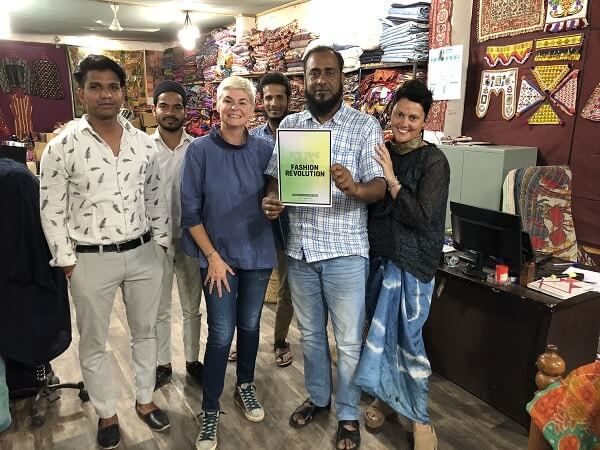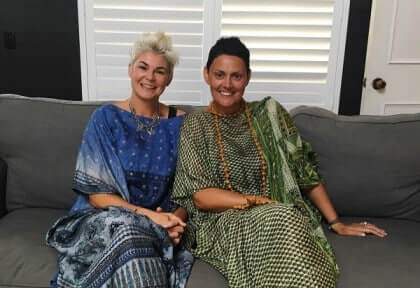The $5 t-shirt and the $15 dress at the local chain store look like a steal. But wait. Think. How is it possible to sell clothes at such low prices? Think twice before you grab this bargain.
The Rana Plaza collapse of 2013, in which 1136 garment workers died, brought to the fore the poor conditions experienced by workers in mass-production clothing factories. For many years, big brands and clothing chains from Australia have sourced their cheap garments from such overseas factories without checking the credentials of their supply chain. Customers at these stores, like you and me, have fuelled demand and indirectly promoted modern-day slavery, child labour and exploitation.
But there is so much changing for the good. It took this disastrous incident for companies to start investigating where their products come from and the conditions in which they are made. The good news is many corporations now realise they have the power to make a difference.
The 2016 Australian Fashion Report, which grades clothing brands based on the strength of their labour rights management systems, has shown substantial improvements being made in this area.
Though it is no surprise that top A+ ratings go to Fairtrade brands such as Etiko, it is a shame that an expensive, high end brank such as Oroton is ranked at a D. In comparison, K-Mart is far better at B grade.
The sustainable or ethical fashion movement and the slow clothing movement, which have taken off since this accident, promote social and environmental sustainability. Many smaller operators in the clothing industry, such as Kim and Kath from Sydney’s The Possibility Project, use new and recycled materials to create beautiful garments with a story.

At The Possibility Project, it all started when Kim, a former high school teacher of Economics and Business Studies, decided to teach her students about practical entrepreneurial skills, creative thinking and social justice. The students collected their favourite home recipes and put together a cookbook which they sold and raised $4000. They sent these funds to I-India, an NGO working with street children in Jaipur. The realisation that this amount was enough to feed 20,000 children made Kim and the students wake up to the possibility of using their gifts for a bigger cause.
Kim then met Kath, a fashion designer and mum whose kids went to the same school as hers, and they struck up a friendship of “great healing and immense purpose”, as Kath describes it. Unlike the self-obsessed, satirical suburban duo Kath and Kim of the ABC television show of the same name, this pair decided to use their creative gifts and good fortune of comfortable lives on Sydney’s North Shore, to work on charity projects with I-India.
Engaging with the I-India vocational training program, Kath uses her eye for design to create products for the slumwear108 range, reimagining materials like old silk sarees and converting them to garments with a Western sensibility. These are sold through their online store as well as at their ‘possibility’ talks to schools, corporates and the broader community, where they tell the stories behind these products.
Kim says she considers this engagement with their customers a win-win for all – people feel good about buying something that supports those in need, the creators of these garments receive a good wage and the satisfaction of creating something special, and the environment benefits from reuse of materials. “It’s not just a pity purchase which remains unworn in the cupboard; our customers buy a beautiful creation with a story behind it,” says Kim. “Hopefully they also take away empowered attitudes.”
These enthusiastic ladies do not consider themselves any kind of ‘saviours of humanity’ or ‘crusaders of sustainability’ but rather, the purveyors of possibility.
They travel to India twice a year to source materials for their garments and train the people who stitch them at I-India. Kim, who is of an Anglo-Indian background and originally comes from Chennai, has lived in Australia for most of her life. She says that though it is easy to be overwhelmed by the poverty in India, they go into those spaces with curiosity and love and look upon the opportunity to work with I-India at the grassroots level as a complete privilege.
They have also started the ‘Sparrow Sanitation’ project which supports the making of compostable sanitary pads out of wood pulp. Deepak and Tulsi, former street children supported by I-India, now lead this project.
Kath and Kim wish to inspire others into action and have little desire to be portrayed as heroes. As Kath jokes, “We are all heroes, only we have a website!”
Another east-west collaboration is Bhalo (Bengali for ‘good’), a design label established by Shimul Minhas Uddin from Bangladesh and Jessica Priemus from Australia. Their clothing is woven and tailored in rural Bangladesh. This keeps traditional crafts alive and stems the flow of migrant labour into Dhaka city, keeping families together. Bhalo uses ‘slow’ techniques in their clothing – hand-loomed cotton fabrics, hand embroidery and applique, as well as chemical-free dyes. Bhalo garments are available at various stores in Australia and through their online shop.
Another label, Bhumi by Vinita Baravkar sells Australian Certified Organic products online and through their Melbourne store. The entire supply chain of Bhumi’s range of clothing and home furnishings is closely monitored; from organic farmers planting their cotton seeds to the dyes used and the weaving of cotton through to its tailoring.
These small businesses prove that our choices as a consumer can help to make the world a better place. They also prove that style and conscience can co-exist. Ethical fashion doesn’t have to be frumpy. Be it recycled, Fairtrade or organic, buy less and buy better.
Link up with us!
Here’s a list of Indian Link platforms you can find our content on and follow us:
Indian Link News website: Save our website indianlink.com.au as a bookmark.
Indian Link E-Newsletter: Subscribe to our weekly e-newsletter.
Indian Link Newspaper: Pick up up a copy at your local spice store, or click here to read the e-paper
Indian Link app: Download our app from Apple’s App Store or Google Play and subscribe to the alerts.
Facebook: Like and follow our page Indian Link
Twitter: Follow us at twitter.com/indian_link
Instagram: Follow us at instagram.com/indianlink
LinkedIn: Follow us at linkedin.com/IndianLinkMediaGroup
YouTube: Subscribe at youtube.com/c/IndianLinkAustralia







